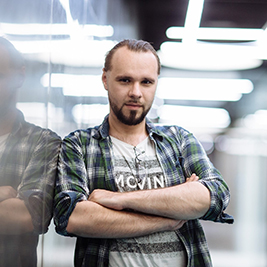Bank of Portraits / Molchanova (Hryniova) Natalia

Molchanova (Hryniova) Natalia
Natalia Molchanova (Hryniova) moved to Kyiv in 1938 being 15 y.o. She lost her parents early and went to the city searching for a job and flat. Before the war she worked as a nurse, then as an accountant’s assistant at the Darnytsia Train Car Repair Plant (DVRZ).
After the German troops occupied Kyiv, the work of the plant did not stop. Only its administration changed. Natalia received the room in the abandoned flat. The plant was headed by the Germans, so they needed the interpreters to communicate with the employees. The interpreter, whose name was Nadia Savchenko, was settled in the room of Natalia. In spite of the significant age difference (Natalia was 12 years younger than her new neighbor), they became friends soon.
Nadia opened her secret to Natalia: she was a Jew and her real name was Dina Pronicheva. Before the war she worked at the city puppet theater. In the wartime, she became a typist in the communications department of the 37th Army staff. During the retreat of the Soviet troops from the Ukrainian capital, Dina was allowed to remain in Kyiv as the mother of two babies.
She was among very few who survived the shooting of the Jews in Babyn Yar. On September 29, 1941, the first day of the mass executions, she lost her parents. Dina was nearly killed (her belongings were confiscated), when her parents shouted to her from the rows to escape as she did not look like a Jew. Dina behaved like she was a Ukrainian and came to assist her acquaintances. It was very useful to have the ID with the Russian surname there and no ethnicity mentioned.
For a few days she was roaming around the city, looking for a shelter. She hid in the bush, garbage and the constructors’ trailers. She ate the vegetables which had not been picked from the gardens yet. Once, she tried to hide in someone’s shed, but the owners reported against her. Dina was repeatedly arrested and sent to the execution, but on the way she and the female prisoner of war Liuba jumped from the truck and escaped.
Finally, Dina managed to receive the documents on the name of Nadia Savchenko (Savycheva) and got a job at the DVRZ. However, she had her two children: 4-year-old Lida and 1.5-year-old Volodia. Viktor, Dina’s husband, was Russian and was not threatened by the immediate shooting. Nevertheless, children from the mixed marriages had to be exterminated as well according to the Nazi plans.
Listening to her friend, Natalia agreed to visit her husband. At the meeting, she told him that his wife was alive. Viktor asked Natalia to take Volodia with her. Lida was left in the orphanage, but the boy was too little. The man was afraid of possible arrest and did not want to risk his children. Natalia agreed to take the child with her and for some time Volodia had been living with his mother. Viktor’s fears were reasonable: he was arrested and shot dead shortly after that.
Then the danger of execution emerged for Dina and her son. One of the employees, learning about her origin, reported on her to the director of the plant, the Nazi Kolbe. The only thing saved her: the German firstly interrogated Natalia and she managed to warn Dina about the danger. The woman had to flee again, leaving little Volodia to her friend.
Dina Pronicheva moved from Kyiv to Bila Tserkva, where she was fortunate to join the local theater. Together with the group, she toured around the Kyiv region until the Red Army eliminated the Nazis from Kyiv.
For some time, Natalia Molchanova had to combine her work at the train car repair plant with care of child. The officer of the auxiliary police Serhii, as it turned out later, the underground activist, advised her what to do. He told her to leave Volodia in the orphanage under the false surname, while he submitted a statement that he found the boy in the street. After this the life stories of Natalia and Dina separated.

Dina Pronicheva survived and continued her work at the puppet theater after the war. In January – February 1946, she took part in the so-called Kyiv Trials as one of the witnesses of the mass murders of the Jews in Babyn Yar. There was investigation of cases of the German military and police officers, who were accused of organizing the mass reprisal against the civilians. Among the convicts were Head of Security Police and Gendarmerie in the Kyiv and Poltava regions P. Scheer, Rear Commandant of the 6th Army K. Burkhardt, Head of Commandant’s Office Major-General O. Tschammer, Gebietskommissar of the Melitopol District H. Hainisch, Commandant of Korosten Lieutenant-Colonel H. Trukkenbrod and others. 12 of 15 convicts were sentenced to death penalty.
The testimony of Dina Pronicheva as one of the few survivors in the Babyn Yar shooting became the basis for the accusations of the German war criminals. Later they gave the ground to the novel of Anatolii Kuznetsov “Babyn Yar”.
Until 1943, Natalia was a member of the underground group that operated among the DVRZ workers. Together with others, she distributed the agitation leaflets, received information on the military loads transferred across Kyiv. She joined the partisan unit and then was listed to the communication regiment of the 13th Army. She was awarded many decorations until the war ended. After that she returned to work at the DVRZ, where she spent 45 years.
On July 6, 2003, Yad Vashem honored Natalia Molchanova with the honorary title “Righteous Among the Nations”.

Maksym Milevskyi
Kyiv
The National Museum of the History of Ukraine in the Second World War
-
fingerprintArtefacts
-
theatersVideo
-
subjectLibrary

